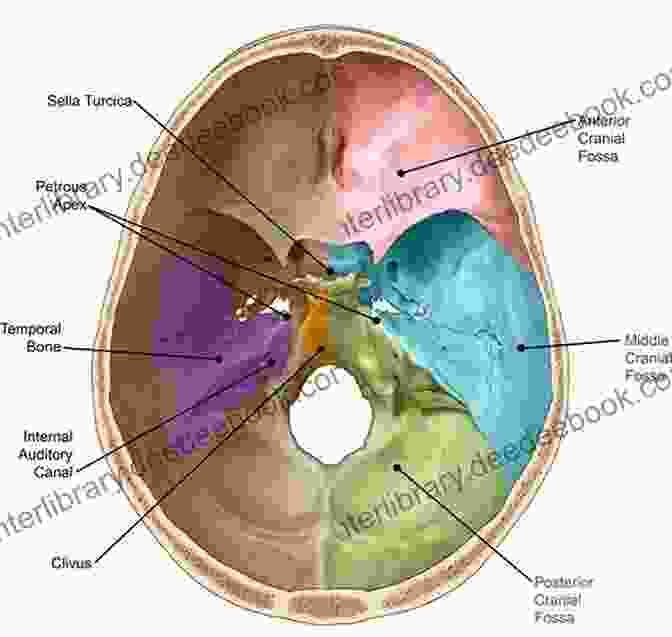Comprehensive Management of Skull Base Tumors: An Interdisciplinary Approach to Complex Care

5 out of 5
| Language | : | English |
| File size | : | 26051 KB |
| Text-to-Speech | : | Enabled |
| Screen Reader | : | Supported |
| Print length | : | 600 pages |
Skull base tumors are a diverse group of neoplasms that arise from the structures at the base of the skull. These tumors can be benign or malignant, and they can range in size from small and localized to large and invasive. Skull base tumors can cause a variety of symptoms, depending on their location and size. These symptoms can include headache, facial pain, vision problems, hearing loss, and difficulty swallowing.

The diagnosis of a skull base tumor is typically made based on a combination of imaging studies, such as MRI and CT scans. Biopsy may also be necessary to confirm the diagnosis and determine the type of tumor.
The treatment of a skull base tumor depends on its location, size, and type. Treatment options may include surgery, radiation therapy, chemotherapy, and targeted therapy. In some cases, a combination of these treatments may be necessary.
Prognosis
The prognosis for patients with skull base tumors depends on a variety of factors, including the type of tumor, the stage of the tumor, and the patient's overall health. The 5-year survival rate for patients with skull base tumors is approximately 50%. However, the prognosis can be much better for patients with smaller, less aggressive tumors.
There are a number of factors that can affect the prognosis of patients with skull base tumors. These factors include:
- The type of tumor
- The stage of the tumor
- The patient's age
- The patient's overall health
- The treatment received
Comprehensive Management
The management of skull base tumors is a complex and challenging process. It requires a multidisciplinary approach that involves a team of specialists, including neurosurgeons, otolaryngologists, radiation oncologists, medical oncologists, and pathologists.
The goal of comprehensive management is to achieve the best possible outcome for the patient, while preserving the patient's quality of life. This may involve surgery, radiation therapy, chemotherapy, targeted therapy, or a combination of these treatments.
Surgery is the most common treatment for skull base tumors. The type of surgery will depend on the location and size of the tumor. Surgery can be performed through a variety of approaches, including the transcranial approach, the transnasal approach, and the transorbital approach.
Radiation therapy is another common treatment for skull base tumors. Radiation therapy can be used to shrink the tumor or to kill cancer cells. Radiation therapy can be delivered externally, using a machine called a linear accelerator, or internally, using radioactive implants.
Chemotherapy is a type of drug therapy that is used to treat cancer. Chemotherapy can be used to kill cancer cells or to shrink the tumor. Chemotherapy is typically given intravenously.
Targeted therapy is a type of drug therapy that is designed to target specific molecules that are involved in cancer growth. Targeted therapy can be used to kill cancer cells or to shrink the tumor. Targeted therapy is typically given orally.
Interdisciplinary Approach
The interdisciplinary approach is essential for the successful management of skull base tumors. A team of specialists from different disciplines can work together to provide the best possible care for the patient.
The interdisciplinary team may include:
- Neurosurgeons
- Otolaryngologists
- Radiation oncologists
- Medical oncologists
- Pathologists
The interdisciplinary team will work together to develop a comprehensive treatment plan that is tailored to the individual patient's needs. The team will also monitor the patient's progress and make adjustments to the treatment plan as necessary.
The interdisciplinary approach has been shown to improve the outcomes of patients with skull base tumors. Patients who are treated by an interdisciplinary team are more likely to have a successful outcome and to maintain a good quality of life.
Summary
Skull base tumors are complex lesions that require a multidisciplinary approach to management. The interdisciplinary team will work together to develop a comprehensive treatment plan that is tailored to the individual patient's needs. The goal of comprehensive management is to achieve the best possible outcome for the patient, while preserving the patient's quality of life.
References
- Khorshid, L., & Curtin, H. D. (2019). Skull Base Tumors. In J. M. Tew (Ed.),Skull Base Surgery (pp. 703-728). Oxford University Press.
- Castelnuovo, P., & Al-Mefty, O. (2019). Management of Skull Base Tumors. In M. M. Baumgartner (Ed
5 out of 5
| Language | : | English |
| File size | : | 26051 KB |
| Text-to-Speech | : | Enabled |
| Screen Reader | : | Supported |
| Print length | : | 600 pages |
Do you want to contribute by writing guest posts on this blog?
Please contact us and send us a resume of previous articles that you have written.
 Page
Page Chapter
Chapter Story
Story Genre
Genre Reader
Reader Paragraph
Paragraph Sentence
Sentence Glossary
Glossary Bibliography
Bibliography Foreword
Foreword Preface
Preface Synopsis
Synopsis Annotation
Annotation Footnote
Footnote Manuscript
Manuscript Codex
Codex Bestseller
Bestseller Classics
Classics Narrative
Narrative Autobiography
Autobiography Encyclopedia
Encyclopedia Dictionary
Dictionary Card Catalog
Card Catalog Borrowing
Borrowing Stacks
Stacks Archives
Archives Study
Study Research
Research Scholarly
Scholarly Lending
Lending Reserve
Reserve Academic
Academic Journals
Journals Reading Room
Reading Room Rare Books
Rare Books Dissertation
Dissertation Storytelling
Storytelling Awards
Awards Book Club
Book Club Theory
Theory Italo Svevo
Italo Svevo A S Byatt
A S Byatt A R Ivanovich
A R Ivanovich Stephanie Cowell
Stephanie Cowell Laura Wilkinson
Laura Wilkinson Ann Fahl
Ann Fahl Rahul Roushan
Rahul Roushan Markus Wagner
Markus Wagner Patrick Hodges
Patrick Hodges Cindy Rollins
Cindy Rollins Jeff Carroll
Jeff Carroll Dean Sale
Dean Sale Mahdi Rezaei
Mahdi Rezaei Kiersten Modglin
Kiersten Modglin J Paulo Davim
J Paulo Davim Frank Fiorenza
Frank Fiorenza Orestes Augustus Brownson
Orestes Augustus Brownson Theresa Ward
Theresa Ward Juanita Bynum
Juanita Bynum Sue Moorcroft
Sue Moorcroft
Light bulbAdvertise smarter! Our strategic ad space ensures maximum exposure. Reserve your spot today!
 Isaac MitchellFollow ·4.6k
Isaac MitchellFollow ·4.6k Darius CoxFollow ·4.9k
Darius CoxFollow ·4.9k Craig BlairFollow ·19.6k
Craig BlairFollow ·19.6k Liam WardFollow ·11.4k
Liam WardFollow ·11.4k David PetersonFollow ·2.6k
David PetersonFollow ·2.6k Gabriel Garcia MarquezFollow ·6.4k
Gabriel Garcia MarquezFollow ·6.4k Virginia WoolfFollow ·17k
Virginia WoolfFollow ·17k Eric NelsonFollow ·5.5k
Eric NelsonFollow ·5.5k

 Bo Cox
Bo CoxDiscover the Enchanting Allure of Collingwood, Ontario,...
Nestled amidst the breathtaking landscape of...

 Ralph Ellison
Ralph EllisonThe Street of Clocks Poems: A Poetic Journey Through Time
Welcome to The Street...

 Dwight Blair
Dwight BlairCritical Political Economy of the Middle East and North...
The Middle East and...

 Deion Simmons
Deion SimmonsPerfect Strategies For Painting Amazing Marine Creatures...
Gouache is a...

 Hugh Bell
Hugh BellThe American Republic: Constitution, Tendencies, and...
The American Republic,...
5 out of 5
| Language | : | English |
| File size | : | 26051 KB |
| Text-to-Speech | : | Enabled |
| Screen Reader | : | Supported |
| Print length | : | 600 pages |














